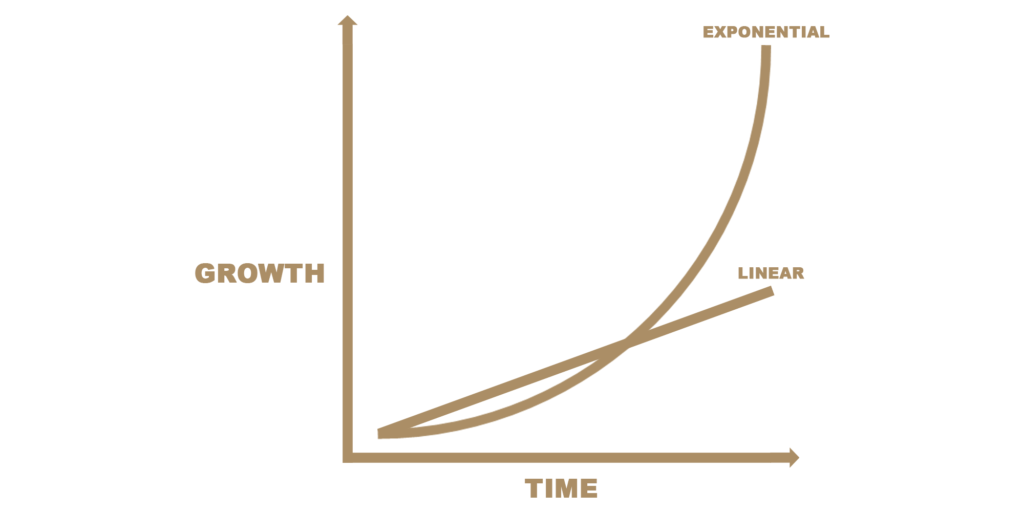In this post, we’ll unpack all you need to know about The Exponential Age, defining exactly what it is, exponential versus linear growth, why humans underestimate exponential change, how to leverage it and more.
What Is The Exponential Age?
The Exponential Age refers to a period characterised by rapid technological advancements and innovations that grow at an exponential rate.
Exponential Growth Versus Linear Growth
Exponential growth increases at a compounded rate. Linear growth increases at a constant rate. Exponential growth is defined by curved lines. Linear growth is defined by straight lines.

The Exponential Age
Complexity scientists refer to moments of radical change as phase transitions. The rapid reorganisation of modern society is such a moment. A phase transition has been reached and the transformation is unfolding right before our eyes.
For example, consider the first microchip that contained four thousand transistors that cost one dollar each compared to today’s state-of-the-art microchips that feature more than six trillion transistors that fractions of a penny. They’re 6,500 times faster and 4.2 million times cheaper. That’s exponential.
Thanks to technological advances, society is being propelled forward by many new innovations including computing, artificial intelligence, robotics, 3D printing, renewable energy, energy storage and breakthroughs in biology and manufacturing.
Why Humans Underestimate Exponential Change
From an evolutionary perspective, the human brain evolved to operate in an environment of slow change. As a result, the human brain, by default, developed to think linearly instead of exponentially, making it difficult to grasp the rapid acceleration and large-scale impact of exponential processes.
Thus, while we live in modern-aged times defined by fast transformation, we still bear stone-aged minds designed for slow transformation.
Is The Exponential Age Good Or Bad?
Conversations around technology naturally bring up the question of whether it is “good or bad.” People on one side of the argument believe that technology is helpful to humanity while those on the other side believe technology is harmful.
However, the truth is, technology is neither good nor bad. Technology is neutral. How we chose to harness the power of technology is what determines its affects.
An analogy may help. A knife can be used to either slice a loaf of bread or kill someone. The knife itself is neither good nor bad, it’s our intention and how we chose to use it that ultimately matters.
The Exponential Age & Productivity
In the Exponential Age, advancements in technology and automation exponentially boost human productivity by enabling more work to be done faster and more efficiently and in innovative ways previously unimaginable.
In other words, human productivity is transitioning from horizontal to vertical meaning humans can generate more output, with less energy.
Technology Is Deflationary
As technology develops exponentially, it leads to cheaper prices. In other words, technology is deflationary. The cheaper technology is, the more affordable it is and therefore the more people who own it.
There is no better example of how technology decreases prices than than in biology ― specifically, decoding the human genome. According to estimates, it cost between $5million and $1billion to decode the first human genome which was sequenced in the year 2000. Now, however, the human genome can be sequenced for as little as $100, representing an astounding million-fold drop in price.
How To Benefit From The Exponential Age
The key to leveraging The Exponential Age can be defined in one word: education. We must constantly update our Model Of The World with knowledge of new technologies and then develop the skills to maximise their potential.
A defining feature of the human species is its ability to adapt and this ‘skill’ has been no more critical than in the Exponential Age.
Summary (TL;DR)
We are living in a society that is in the midst of dramatic transformation. We are living in a time where the rate of transformation is accelerating. As a result, we are living in a new era. We are living in The Exponential Age.
The Exponential Age refers to a period characterised by technological advancements and innovations that grow at an exponential rate.
Humans struggle to grasp exponential growth because, from an evolutionary perspective, we evolved to perceive linear changes instead of exponential changes.
The key to leveraging The Exponential Age is to constantly educate ourselves and refine our Model Of The World. In doing so, we can make more effective decisions which ultimately lead to better results.







